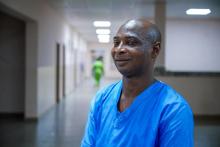As Nigeria battles COVID-19, volunteers remain critical to the outbreak response.
Abuja, May 26, 2020 - Resilient and undeterred, even when grappling with limited equipment, shortage of supplies and grumpy patients, 47 year-old Nurse Hassan Salami Onimisi volunteers at the Federal Capital Territory (FCT) Gwawalada Isolation Center to care for COVID-19 patients.
Onimisi works in a teaching hospital as an accident and emergency nurse and has been in the profession for the past 21 years but volunteers to take extra hours to support Nigeria’s COVID-19 response in a different facility. When the first isolation center was set up in Abuja, Mr Onimisi was one of the very few that volunteered to offer their services to humanity.
“My decision to volunteer came when a lot of health workers absconded upon hearing about the first COVID-19 case in the city, knowing fully the modes of transmission and the thousands of lives lost overseas, many felt they couldn’t risk their lives for that, especially in a country with limited healthcare facilities and close to zero personal protective equipment (PPE), but the patients need someone to take care of them, someone must do that.” he mentioned.
“As officer in charge of the isolation center. I admit patients on a daily basis, counsel them, take care of their medications and monitor their vitals by measuring temperature and blood pressure among others. Sometimes I serve as a link between the patients and their families, as we give feedback patient’s families”, Mr Onimisi says.
According to him, an average of eight patients are admitted into the facility on daily basis, “However, 107 have fully recovered and we currently have over 300 under our care. We are encouraged with the fact there is high recovery rate among patients due to the care they receive in this health facility.”
Mr Onimisi is one of over 12, 000 volunteers in the 36 states and FCT. The volunteers include which medical doctors, nurses, pharmacists, DSNO’s, teachers, youths and other trained health workers currently risking their lives to save people battling COVID-19. Many were initially shunned by relatives and friends who feared they would pass on the infection to them, but over the time, with training and support from World Health Organization and partners led by Nigeria Center for Disease Control (NCDC), the social stigma associated with the disease is gradually diminishing.
Meanwhile, Mr Onimisi is not left out of the constant challenges that come with working in Isolation Centers, which range from operational activities to dealing with individuals patients. For him, the most challenging part of volunteering for COVID-19 is logistics, in which commuting tends to be almost impossible with the lockdown in place, resulting in restricted movements.
WHO currently provides technical assistance for Risk Communication in communities, contact tracing and active case search. Only recently in Borno state, WHO trained 50 journalists on infection, prevention as well as control and how to disseminate disease preventive messages to the general public.
Technical Contacts
Dr Banda Richard; Email: bandari [at] who.int; Tel: +234 803 888 8269
Ms Hafsat Danmaisoro; Email: Danmaisoroh [at] who.int; Tel: +234 906 297 8503




